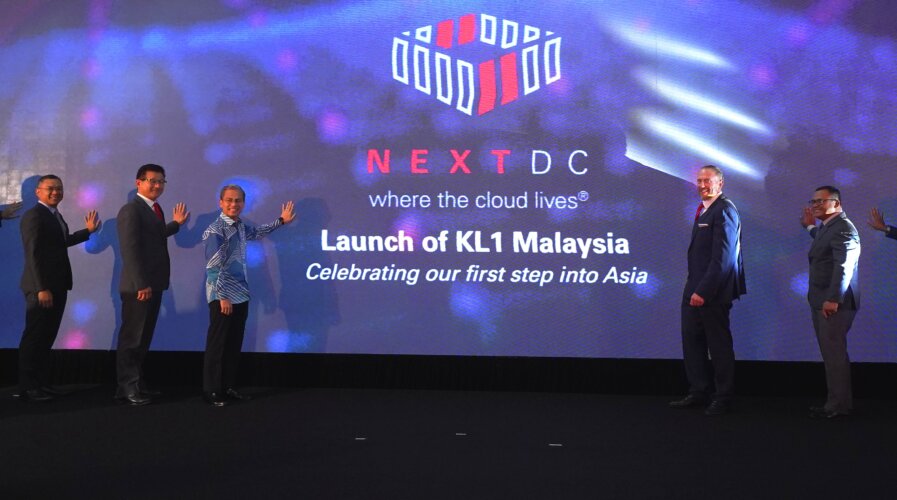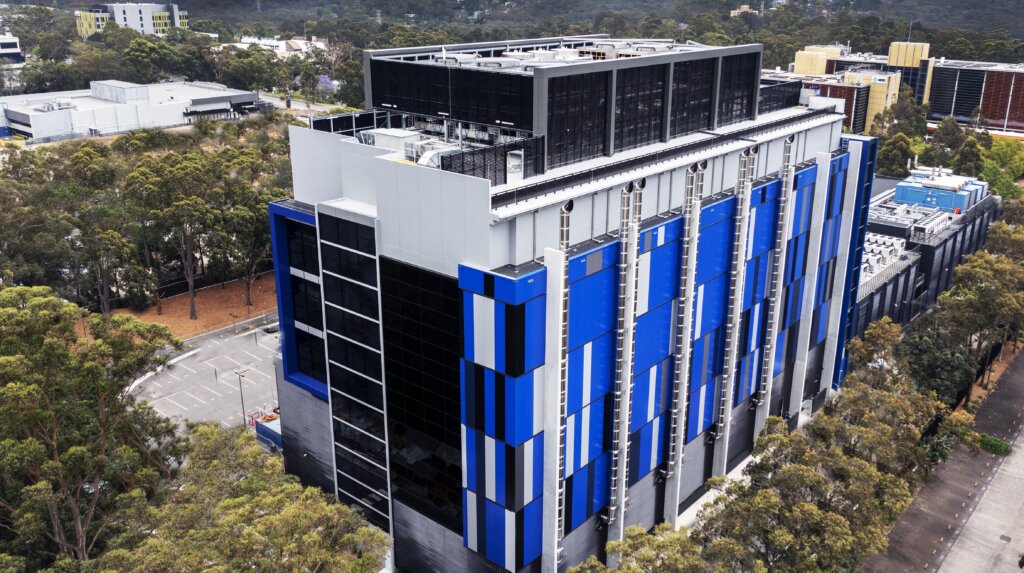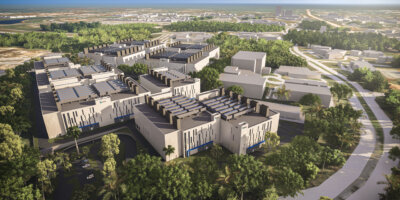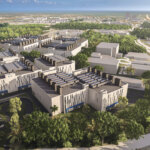
The launch of KL1
Australian data centers expand investments
- NEXTDC, enters Malaysian market with KL1 development.
- NEXTDC to invest RM3 billion in Malaysia over 5-10 years.
- Meanwhile, Macquire Data Center invests in more secure zones.
The data center industry is experiencing rapid global growth, and the APAC region is poised to become a key player in the sector’s future. Australian data center companies, in particular, are actively expanding their presence in APAC, seizing the opportunity presented by the increasing need for robust digital infrastructure and reliable data management solutions. Leveraging their expertise and advanced technology, these companies are at the forefront of shaping the data center landscape and fueling innovation throughout the APAC region.
Australian data centers are also investing in their infrastructure as they look to increase their capacity and meet regulatory requirements. Australia has 112 data centers, run by 55 organizations. Equinix has the largest presence with 13 facilities, and other organizations include NextDC, AAPT, and Vocus Group.
Malaysia has emerged as the hottest data center investment market in the industry. Malaysia has already witnessed several large data center providers announcing plans to expand their capacity in the country in 2023. Now, NEXTDC Limited is making its entry into the Malaysian market. Its first venture, KL1, will be a state-of-the-art data center facility located in the Klang Valley.
Upon completion, KL1 will become the first Uptime Institute (UI) Tier IV certified data center in Peninsular Malaysia. Strategically situated in Petaling Jaya, less than 10km from Kuala Lumpur, it offers close proximity to major networks and business hubs in the Klang Valley. With plans for rapid scalability and approximately 65MW of IT critical power, the facility will provide direct cloud interconnectivity, welcoming customers from 2025.
Why Malaysia is perfect for hosting data centers?
In Malaysia, Cyberjaya in the state of Selangor and the Iskander region in the state of Johor have become key real estate areas for data center development. Cyberjaya is already home to several large companies including Bridge Data Center, NTT and AIMS Data Center. In Johor, Keppel, YTL and Equinix are also building and operating data centers.
Petaling Jaya is a residential area, raising questions regarding its suitability for hosting data centers. While it might seem counterintuitive to have a facility generating high power – and potential noise and heat – near residential properties, there are specific circumstances where this arrangement can be suitable.
According to Craig Scroggie, CEO of NEXTDC, it’s essential to recognize that the data center industry, represented by NEXTDC, now builds data centers in capital cities close to the population. With increasing use of latency-sensitive services like Netflix, video streaming, and Spotify, immediate access to content is a user expectation.
Scroggie explained, “Just as power networks need to be situated close to residential and commercial areas, information also needs proximity. Where information resides is crucial for the quality of digital services, healthcare, real-time support, and government systems. Therefore, it is important to locate the data center near the city and its users. This requirement has been defined for the future of data centers, especially with the rise of artificial intelligence and anticipated technological advancements in the knowledge economy. The network connectivity that enables data to reach users will be a critical piece of infrastructure.”

Craig Scroggie, CEO of NEXTDC
NEXTDC has extensive experience building data centers within cities. Its data centers in Sydney, Brisbane, and Melbourne are situated alongside multi-storey apartment buildings housing hundreds of residents. In addition to adhering to world-leading sustainability standards, recycling water, and maintaining zero waste, the company prioritizes environmental security and ensures its data centers operate quietly.
“Our choice of Petaling Jaya, Selangor, takes into account the power requirements, proximity to the population, and environmental considerations to provide reliable and efficient data center services,” Scroggie added.
The game-changing data center investment in Malaysia
KL1 marks NEXTDC’s expansion into Asia, targeting some of the largest and fastest-growing data center markets. Scroggie is enthusiastic about NEXTDC’s expansion into Asia, developing the KL1 data center and establishing its Regional Operations Centre. He emphasized that the KL1 facility would be at the forefront of global sustainability benchmarks and critical infrastructure standards.
At the Mandarin Oriental Kuala Lumpur, NEXTDC unveiled the intention to leverage its ecosystem of over 750 technology partners, including global hyperscale customers, to promote services in KL1. Many of these partners intend to establish operations in Malaysia, alongside existing and new enterprise, and government customers.
As part of its Asian expansion, NEXTDC will establish a Regional Operations Center in Malaysia to support growth across the Asian region. This move demonstrates its commitment to investing in the region, as several Asian economies are experiencing strong economic tailwinds and rapid uptake of digital services.
Over the next five to ten years, NEXTDC plans to invest approximately RM3 billion in Malaysia. Additionally, the company will focus on digital skilling and educational initiatives to empower Malaysia’s ICT and digital workforce, enhancing the country’s competitive advantage in Asia.
Tengku Datuk Seri Utama Zafrul Tengku Abdul Aziz, the Minister of Investment, Trade, and Industry (MITI), expressed his appreciation for NEXTDC’s choice of Malaysia as its investment destination outside the Oceania region. This decision signifies NEXTDC’s confidence in Malaysia’s investment and business ecosystem, further solidifying its reputation as a top-tier destination for data center investments and its position as a preferred digital hub in Southeast Asia.
“As a supportive component of a digital economy, NEXTDC’s strategic initiative is also well-aligned with our New Investment Policy, which aspires to create a more sustainable, balanced, and inclusive socio-economic growth moving forward,” said the minister. “MITI and its agency, MIDA, are committed to facilitating the success of NEXTDC’s strategic initiative in Malaysia, particularly towards helping us create higher-paying jobs and a more vibrant domestic SME supply chain.”

Macquarie Data Centres has completed multi-million-dollar upgrades to its Sydney and Canberra data centers. (Source – Macquarie Data Centers)
Macquarie Data Center took initiative with its data center
In parallel with NEXTDC’s new data center launch in Malaysia, another Australian data center company, Macquarie Data Center, recently upgraded its data center campuses in Sydney and Canberra. Macquarie Data Center invested millions of dollars in these upgrades, specifically focusing on adding secure zones to enhance capacity, security posture, and compliance for government and enterprise customers.
The new secure zones meet the highest levels of the Australian Federal Government’s security framework. Macquarie Data Centers’ operations align with physical and cybersecurity standards, positioning them as a fully sovereign provider. The upgrades also expanded rack capacity and other secure zones across the Sydney and Canberra campuses, catering to the growing demand for data-intensive workloads like artificial intelligence.
David Hirst, Group Executive of Macquarie Data Centers, highlighted the significance of these upgrades for local and international customers. The increased capacity allows businesses to scale their operations and establish a stronger presence in Australia. Macquarie Data Centres serves many clients, including government agencies, hyperscale companies, and multinational corporations. The project was completed within six months without disturbance to Macquarie Data Centres’ existing customers.
As the data center landscape continues to evolve and expand, both NEXTDC and Macquarie Data Centres are actively contributing to the growth and development of digital infrastructure in their respective countries and across the Asian region. Their investments and initiatives underscore the increasing importance of data centers in supporting the digital economy and driving innovation in the modern world.
READ MORE
- Data Strategies That Dictate Legacy Overhaul Methods for Established Banks
- Securing Data: A Guide to Navigating Australian Privacy Regulations
- Ethical Threads: Transforming Fashion with Trust and Transparency
- Top 5 Drivers Shaping IT Budgets This Financial Year
- Beyond Connectivity: How Wireless Site Surveys Enhance Tomorrow’s Business Network


